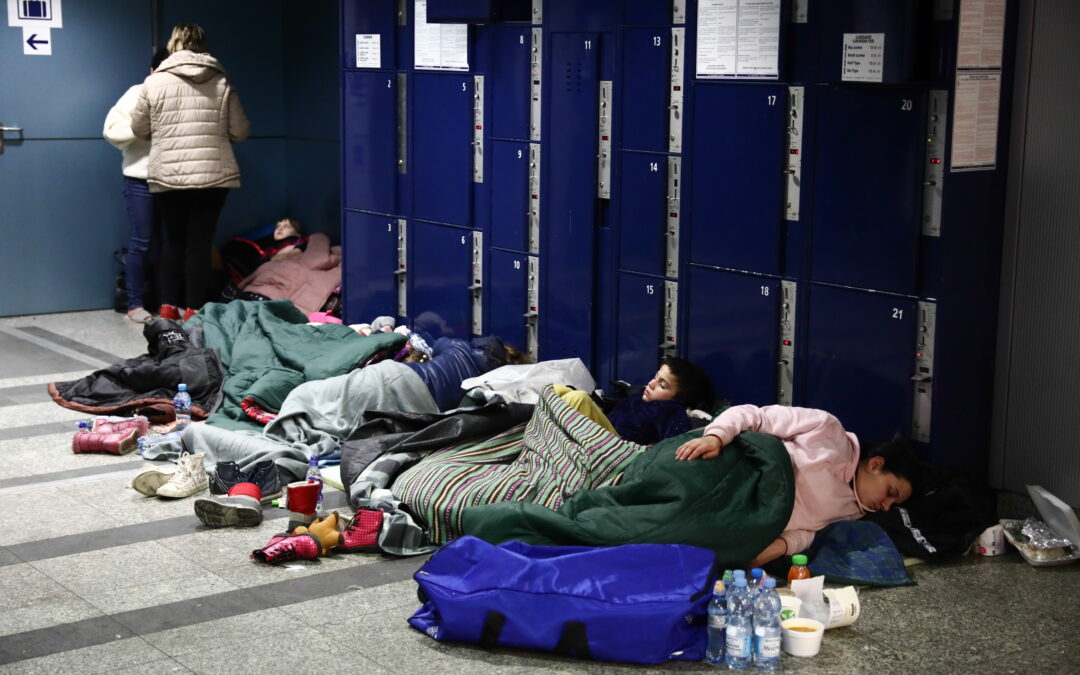As refugees continue to flee from Ukraine to Poland, major cities – including the capital, Warsaw – have warned that they have reached their capacity to accommodate and help those arriving. They have called for an international system of support to be put in place.
The number of people crossing into Poland from Ukraine since Russia’s invasion has now passed 1.5 million. While some of those have moved on to other countries, a large proportion remain in Poland.
The government has not set up camps or other large-scale housing facilities and, as a result, those crossing the border have often moved on to large cities around the country. Many have been provided with accommodation and other support by local authorities, businesses and private individuals.
The reception point for refugees at Kraków's main train station is similarly struggling to cope with the growing number of people arriving.
Local authorities, NGOs and volunteers have also called for more help from the central government https://t.co/eEL3EdmZxD
— Notes from Poland 🇵🇱 (@notesfrompoland) March 10, 2022
But, as numbers continue to swell, there have been growing reports of difficulties in many cities, including Warsaw, where many refugees have been sleeping on the floor at the city’s central train station.
At least 200,000 refugees have been housed in Warsaw (equivalent to over 10% of the city’s population), reports the Rzeczpospolita daily. In Kraków, the figure is 100,000 (equivalent to 13% of the population). Thousands more continue to arrive daily.
“Neither the city nor the government can now cope with the wave of refugees from Ukraine,” said Warsaw’s mayor, Rafał Trzaskowski, after a meeting of the Union of Polish Cities. “It is necessary to implement a system of European and international aid.”
Spotkanie Rady @UniaMetropolii z przedstawicielkami @UNHCRPoland – agencji ONZ ds. uchodźców. Wszyscy jesteśmy zgodni, że odruch solidarności Polaków był kluczowy w tym, jak Polska poradziła sobie z pierwszą falą uciekających przed wojną. #StandWithUkraine #SamorządyDlaUkrainy pic.twitter.com/g28b2js6x1
— Rafał Trzaskowski (@trzaskowski_) March 11, 2022
Trzaskowski called for a “swift reaction from the government, which should work out a new system of support”. He said that large-scale reception centres are now needed, and called for Poland to seek help from the United Nations and the European Union.
“We are facing the biggest migration crisis in the history of Europe since World War Two,” he added, quoted by Onet. “During these two weeks Poles and NGOs and city councils have risen to the situation. Yet the biggest challenges are still ahead.”
In Kraków, a spokesman for city hall, Monika Chylaszek, told the Rzeczpospolita daily that “we cannot take any more people, [we cannot] absorb them as a city”. Municipal authorities have already spent 14 million zloty (€2.9 million) of the 19 million allocated in their annual budget for crisis management.
“It’s about jobs, places at schools and preschools, at public offices,” Chylaszek explained. “Even issuing PESELs [personal identification numbers] for such a number of people seems almost impossible.”
She added that the cities have not received any resources from the central government as that support is to be granted only under new regulations agreed by the cabinet on Monday and currently being considered by parliament.
Rzeczpospolita notes that a number of small towns and cities are willing to help spread the burden by taking in refugees, but communicating this information and finding people willing to move there has been difficult.
An unnamed local official told the newspaper that a bus took a large group of refugees from Warsaw to the northeastern city of Białystok. But, when it arrived, they refused to get off and returned to the capital. Likewise, refugees have preferred to remain in Kraków rather than move to small surrounding municipalities.
Main image credit: Jakub Porzycki / Agencja Wyborcza.pl

Agnieszka Wądołowska is deputy editor-in-chief of Notes from Poland. She is a member of the European Press Prize’s preparatory committee. She was 2022 Fellow at the Entrepreneurial Journalism Creators Program at City University of New York. In 2024, she graduated from the Advanced Leadership Programme for Top Talents at the Center for Leadership. She has previously contributed to Gazeta Wyborcza, Wysokie Obcasy and Duży Format.




















